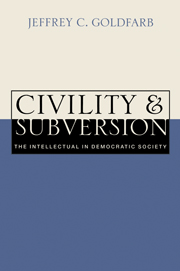Book contents
- Frontmatter
- Contents
- Acknowledgments
- 1 Introduction: the intellectuals at century's end
- 2 Who are the intellectuals?
- 3 The civil intellectual and the public
- 4 The subversive intellectual and the public
- 5 The civil society ideal
- 6 The intellectuals and the politics of culture after communism
- 7 The university
- 8 Race and discursive disruption
- 9 Race and sustained deliberation
- 10 Why is there no feminism after communism?
- 11 Civility and subversion in cynical times
- Notes
- Bibliography
- Index
2 - Who are the intellectuals?
Published online by Cambridge University Press: 06 July 2010
- Frontmatter
- Contents
- Acknowledgments
- 1 Introduction: the intellectuals at century's end
- 2 Who are the intellectuals?
- 3 The civil intellectual and the public
- 4 The subversive intellectual and the public
- 5 The civil society ideal
- 6 The intellectuals and the politics of culture after communism
- 7 The university
- 8 Race and discursive disruption
- 9 Race and sustained deliberation
- 10 Why is there no feminism after communism?
- 11 Civility and subversion in cynical times
- Notes
- Bibliography
- Index
Summary
Intellectuals are ambiguous characters. In societies with strong democratic traditions, such as the United States, they are the objects of popular and elite suspicions. In societies with stronger aristocratic traditions, such as those of Central Europe, they are often the objects of veneration and high hopes. Yet, despite the attention they often get, it is not at all clear who they actually are, and what they actually do. For my contention that intellectuals play a key role in democratic societies to be persuasive, I must clearly specify who it is I think is playing this important role.
The uncertainty about the intellectual's identity is an important sociological fact. It animates intellectual and anti-intellectual life as they function in societies. Sartre's popularity, his position as a celebrity in post-war France and then in much of the world, was predicated on a vague romanticism about the critical intellectual in battle against the regressive forces of injustice, inauthenticity, and Americanism. George Wallace's popularity as a national figure and Presidential candidate in the late sixties and the seventies, in parallel contrast, was based on a similarly vague paranoia directed against “pointy headed intellectuals” and their bureaucratic bedfellows.
Indeed, even some of the most interesting scholarly accounts for and against intellectuals represent their subject with a great deal of ambiguity and imprecision. Thus, Russell Jacoby's fascinating account of The Last Intellectuals makes sense only through the lens of a critical nostalgia for left-wing intellectual giants of previous generations, from Lewis Mumford to Irving Howe.
- Type
- Chapter
- Information
- Civility and SubversionThe Intellectual in Democratic Society, pp. 20 - 41Publisher: Cambridge University PressPrint publication year: 1998



